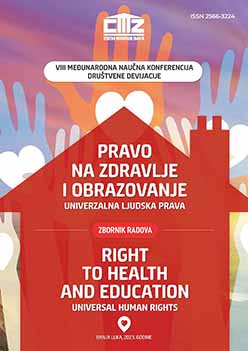STANJE ZDRAVSTVENOG SISTEMA U REPUBLICI SRBIJI TOKOM PANDEMIJE VIRUSA KORONA
STATE OF THE HEALTH SYSTEM IN THE REPUBLIC OF SERBIA DURING CORONA VIRUS PANDEMIC
Author(s): Jelena Stanković, Marina MijatovićSubject(s): Social Sciences, Sociology, Health and medicine and law, Family and social welfare, Social Norms / Social Control
Published by: CENTAR MODERNIH ZNANJA
Keywords: SARS-CoV-2; Covid 19; access; quality; obstetric violence;
Summary/Abstract: The SARS-CoV-2 pandemic has shown that the healthcare system of the Republic of Serbia is not ready to handle challenges. The analysis aims to point out the weaknesses of the health care system during a crisis such as a pandemic, which should be improved to cope with future challenges. The healthcare system has become considerably less accessible compared to the pre-pandemic times, which has continued even after the state of emergency ceased to exist, and the pandemic was officially proclaimed to have ended in the Republic of Serbia. Vulnerable patient groups, including persons with disabilities, people suffering from rare diseases and people living in rural areas, suffered negative consequences the most, as reflected by lower access to healthcare facilities, lower availability of treatment and a lower level of prevention of contracting SARS-CoV-2. No healthcare facility had an internal document regulating patients‟ rights during the pandemic. Patients had their diagnoses established and medicines prescribed through phone calls, which could have affected the protection of personal and sensitive data, and the quality of treatment. Hygiene at primary healthcare facilities was not proper for the pandemic conditions, as reflected by the fact that there is no warm water available in 63% of healthcare facilities, no cold water in 7% of healthcare facilities in total, no hand soap in42% of healthcare facilities, or paper hand towels in 70% of the facilities. During the pandemic, women could not have a companion of choice during childbirth, which, according to the patients, has continued after the end of the state of emergency was proclaimed, causing an increase in the cases of obstetric violence against female patients during childbirth. Regulations on the protection of citizens against infectious diseases were changed through an accelerated procedure, and some particular provisions violated fundamental human rights, such as forcing mandatory immunization against SARS-CoV-2 onto citizens, which resulted in the introduction of the COVID certificate/passport and restriction on movement to people who did not take the COVID-19 vaccine. Through the work with male and female citizens, it is noticeable that the post-pandemic state has not improved and that the healthcare system still uses COVID-19 as an excuse for the inaccessibility of healthcare to patients.
Journal: DRUŠTVENE DEVIJACIJE
- Issue Year: VIII/2023
- Issue No: 8
- Page Range: 474-479
- Page Count: 6
- Language: Bosnian, Croatian, Serbian

